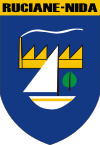Wejsuny
| Wejsuny | ||
|---|---|---|

|
|
|
| Basic data | ||
| State : | Poland | |
| Voivodeship : | Warmia-Masuria | |
| Powiat : | Pisz | |
| Gmina : | Ruciane-Nida | |
| Geographic location : | 53 ° 42 ' N , 21 ° 37' E | |
| Residents : | 380 (2006) | |
| Postal code : | 12-222 | |
| Telephone code : | (+48) 87 | |
| License plate : | NPI | |
| Economy and Transport | ||
| Street : | Ruciane-Nida / DK 58 ↔ Niedźwiedzi Róg | |
| Rail route : |
Olsztyn – Pisz train station: Ruciane-Nida |
|
| Next international airport : | Warsaw | |
Wejsuny [ vɛi̯ˈsunɨ ] (German Weissuhnen , Dorf) is a village in the southeastern Masuria in the Polish Warmian-Masurian Voivodeship , Powiat Piski (district of Johannisburg ), belonging to the municipality of Ruciane-Nida (Rudczanny- , 1938 to 1945 Niedersee- / Nieden ).
Geographical location
The village is located 14 kilometers northwest of the small town of Pisz (German Johannisburg ) on the banks of the Jezioro Wejsunek .
history
The village of Weissuhnen was founded in 1763 as a casket settlement. The amalgamation of the village and the manor district with the forest house located 1.8 kilometers to the south resulted in the new official name Groß Weissuhnen (exact date not known). However, the sole spelling Weissuhnen (incidentally: Weissuhnen) remains in use.
In 1848 Weissuhnen received a school.
In 1900 there were 372 inhabitants in Groß Weissuhnen.
By 1905 the United Weissuhnen belonged to the governmental district Gumbinnen , then the administrative district of Olsztyn . On January 1, 1908, the Weissuhnen district, formed in 1874, now consisted of the communities Konzewen , Groß Weissuhnen and the manor districts of Bärenwinkel , Glodowen and Schnittken. The seat of administration was the forester's house Weissuhnen. In 1931 the Johannisburger Heide manor was added to the administrative district.
Due to the provisions of the Versailles Treaty , the population in the Allenstein voting area , to the Weissuhnen, voted on July 11, 1920 on whether they would continue to belong to East Prussia (and thus to Germany) or join Poland. In Weisssuhnen, 300 residents voted to stay with East Prussia, Poland did not cast any votes.
In 1933 there were 400 inhabitants in Groß Weissuhnen. On July 16, 1938, the official name was changed from Groß Weissuhnen to Weissuhnen. In 1939 Weissuhnen had 434 inhabitants.
On January 27, 1945, the Red Army reached Weissuhnen, whose civilian population had been almost completely evacuated shortly before. There was severe damage from fighting between German and Soviet troops. After the end of the Second World War in 1945, Weissuhnen , which was part of the German Empire ( East Prussia ), fell to Poland. The resident German population, as far as they had not fled, was largely expelled after 1945 and, in addition to the traditional Masurian minority, by new citizens from other parts of Poland. The place was renamed Wejsuny.
From 1975 to 1998 Wejsuny belonged to what was then the Suwałki Voivodeship , then joined the newly formed Warmian-Masurian Voivodeship in 1999 .
church
In 1898 Weissuhnen got its own parish. The first pastor was Heinrich Kull (until 1909).
As the most important building in the village, a neo-Gothic village church with echoes of the religious architecture was built as an exposed brick building with an exposed east tower (contains two bells) and a stepped gable and was built on November 27, 1910 by the subsequently reigning pastor Rudolf Wisniewski (1910-1922) ) inaugurated.
After, among other things, war-related damage in 1945, the church was extensively reconstructed for its 100th anniversary with funds from an anonymous donor and is the only one in the Pisz area that is available to Protestant Christians for services and events. German-language services are also occasionally held here.
More Attractions
In front of the church is a rebuilt memorial stone for the fallen soldiers of the First World War 1914–1918 from the parish of Weissuhnen.
From German times to the present day there is a Protestant cemetery with some soldiers' graves from the First World War right on the shore of the lake .
Footnotes
- ↑ Herbert Marzian , Csaba Kenez : self-determination for East Germany. Documentation on the 50th anniversary of the East and West Prussian referendum on July 11, 1920. Editor: Göttinger Arbeitskreis , 1970, p. 78
- ^ Ostpreußen.net, Wejsuny - Weissuhnen , September 20, 2003





